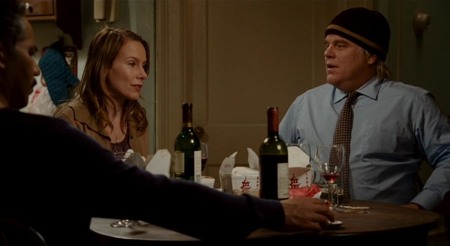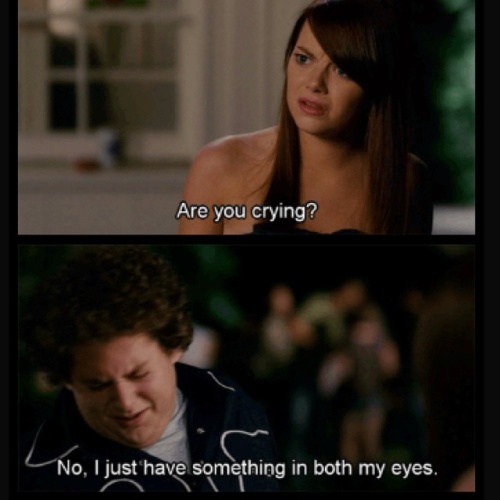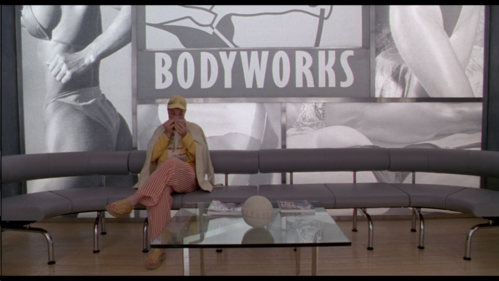I like to present myself as a savvy, even cynical, consumer of media, so it’s a little embarrassing for me to admit my predilection for romantic movies. After participating in the recent #fav7films on Twitter, 3 of my 7 turned out to focus on romantic relationships (4 of 10, if I include my extended list). Look at this current series of articles! A big part of this has to do with the escapist aspect of entertainment, which romantic movies have in spades by their nature. They focus on the segments of relationships where people are acting their best, hormones at their strongest. Even more grounded romantic films like Richard Linklater’s Before trilogy involves relatively privileged people in idyllic settings; Before Sunset, the second installment (and my favorite), takes place in Paris, in real time, during the magic hour. Of course, the characters who fall in love with each other are also idealized: they’re usually affluent (if one is poor, the other is wealthy), occupied with interesting jobs or aspirations, barely concealing beautiful inner lives just waiting to be shared, good-hearted, charming, and physically attractive. Even an average Joe who finds themself as the romantic lead will usually have an iconic speech in their back pocket. And, as I hope I’ve managed to convey in earlier posts, fat characters are almost always positioned as a detracting trait, counter to a happily-ever-after image. There’s usually some form of compensation, some element that seems to say, “Okay, I know what you’re thinking, but this fat person deserves a chance.” This can be Albert and Eva’s extraordinary chemistry (which, to be fair, is a solid example of a romantic film lacking idealization if you want to argue against my thesis), Jack’s and Marty’s pure-heartedness, Angus’ exceptional integrity/athleticism/intellect, or even Danny’s near-supernatural ability to call in a favor (erotic cronyism: only in Chicago). Before this series we even have Louis in True Stories, who finds a bride through a love spell. However, we also have narratives like Hitch and The Tao of Steve, which don’t make exceptions for their fat characters through exceptional character traits, and rather focus on the implementation of romantic strategies to explain why a fat/unattractive man could successfully woo a thin/attractive woman.
The narratives of these films are based on some assumptions that are misguided at best. First, we have the homogenization of attraction: it’s not possible that a fat character would be seen as attractive because there are objective, universal standards that are embedded deep in the hearts and minds of the other characters, and of course, the audience. One of the reasons I started writing CPBS was, in addition to being fat myself, I’m attracted to other fat people, so I get very lost during scenes where it’s supposed to be hilariously icky that Jack Black is naked. (On top of, you know, the alienation when reminded that the entertainment industry uses bodies like mine as visual shorthand for garbage.) Second, both Hitch and The Tao of Steve rely on the regressive heteronormative positioning of man as active pursuer of passive trophy woman, who has the “real” power of being able to veto the relationship. It needs to be said that the overlap of these assumptions function to completely cut fat women out of the picture. The Tao of Steve goes so far as to have protagonist Dex (Donal Logue) declare that he doesn’t fuck fat women. “I am a fat-ist, I admit it. I’m the worst kind of fat-ist, I’m a fat fat-ist.” What a delightful character I resigned myself to spend another hour watching! Considering how this statement occurs early in the film, I suppose it’s supposed to communicate the immaturity that Dex grows out of to win the love of Syd (Greer Goodman), who is coincidentally thin. Yet, since no fat women exist in the film, there’s nobody on the receiving end of this statement, just the abstract phantom of an unfuckable fat woman. Hitch doesn’t even acknowledge that fat women exist. We often think of fat women existing in rom coms as the Less Attractive Best Friend; Casey (Julie Ann Emery) is thin and pretty, her apparent outsider status is due to being Southern (Hitch being of the subgenre of rom coms that take place in Manhattan). Wealthy, beautiful Allegra (Amber Valletta), the object of Albert’s (Kevin James) affections, turns out to be clumsy and awkward, but these traits are only highlighted at the end of the film when she talks about them while sitting on her gigantic yacht. Her transgressions from physical idealization are manifest on her body during the end credits wedding dance party sequence, once the “chase” is over. The object of longing is characterized by physical restraint– thinness, gracefulness, aloofness– which is as true for the mandatorily thin women characters as it is for the fat male characters pursuing them. As Dex says in The Tao of Steve: “we pursue that which retreats from us.” For Dex and Albert, restraint is the foundation of their respective strategies for getting women interested in them. Of course, both learn the art of seduction from thin, traditionally attractive men.
In Hitch, stereotypical accountant Albert hires Hitch (Will Smith), the “date doctor,” to teach him how to get his heiress client Allegra to notice him. Hitch’s philosophy of falling in love comes from a painful experience he had in college of his first girlfriend (Robinne Lee) leaving him because he came on too strong, a heartbreak that was apparently potent enough to transform Charmingly Dorky Will Smith into Charmingly Suave Will Smith. His philosophy does not include outright lying– he tells us in the opening narration that women want to see “the real you”– but he does say that “with no guile and no game, there’s no girl.” He isn’t above manipulating situations, creating meetcutes for his clients. Hitch teaches Albert how to dress and groom himself, but more importantly, how to rein in his dorkiness, which largely manifests as flailing physical comedy bits. Albert is confident that his flamboyant dance moves will impress Allegra, but Hitch orders him to keep it to a dull two-step. Albert can’t maintain control during their date, however, and busts out his ridiculous moves when Allegra isn’t looking at him, his physical tendency towards excess irresistable, even leading him to cheat on his regimen of increased regulation. Hitch too ends up having to deal with his own body betraying him in appropriate ways when on dates with Sara, as he ends up accidentally knocking her into the Hudson River and having an allergic reaction that causes his face to swell up. While mirroring his fat client’s awkwardness, Hitch also mirrors his emotional sincerity, as he struggles with wanting to get more involved with Sara than is his usual comfort level.

“Don’t ever do that again:” Hitch (Will Smith) offers Albert (Kevin James) constructive criticism on his dance moves
If the audience wasn’t already socially conditioned to view fat people as unworthy of love or desire, the opening sequence of The Tao of Steve makes this explicit, as three women Dex went to college with view his body with amused disgust and confess to each other that they all had sex with him back in the day. Albert may be above average in optimism thinking he can win the heart of a millionaire, but Dex is damn near a curiosity. Step up ladies and gents, marvel at the fat man who gets laid on a regular basis! How does he do it? Witty, intellectual Dex has hewn his seduction strategy from observing “the prototypical cool American male” in pop culture, specifically Steve McGarrett, Steve Austin, and Steve McQueen. “He never, ever tries to impress women but he always gets the girl.” The Tao of Steve is Dex’s name for his three-part strategy for getting women to have sex with him: “eliminate your desire… be excellent in her presence.., retreat.” While Dex’s strategy appears to be based on respecting boundaries (wow), sharing interests (amazing), and socializing with women without any expectations of sex (gold star), his reasoning is pretty damn misogynist. Dex says that, based on his looks, “technically [he] shouldn’t be getting laid” and thus women are confused and intrigued by his apparent lack of sexual interest in them, which causes them to assume that sleeping with him is a major achievement on their part, wherein reality he describes himself as being willing to have sex with any woman who has low enough standards (as long as she isn’t fat). He justifies the Tao not working on Syd because she’s smarter than the women he usually is able to seduce. However, the sex that he has is also largely meaningless as he doesn’t desire a connection beyond temporary pleasure with his sexual partners.
Although initially acting under the belief that behaving in a stereotypically masculine way will attract the women they’re in love with, both Albert and Dex have to abandon this facade and be more sensitive and vulnerable to actually win Allegra’s and Syd’s hearts. These traits are often associated with fat men as a way of showing their lack of masculinity, but here we have two very straight rom-coms where romancing a woman is successfully done by letting go of machismo. In Hitch, Albert is contrasted with the thin male characters as the genuinely nice guy. Hitch isn’t bad person, but he’s a player, emotionally distant and commitment-phobic. Allegra’s ex-boyfriend, the prince of Sweden or something like that, is referred to in negative terms. We’re also introduced to Vance (Jeffrey “Burn Notice” Donovan), a potential client who wants Hitch to teach him seduction skills in order to dump a woman after a one night stand. Hitch thinks Albert is a lost cause and is only persuaded to take on his case when Albert reveals the selfless nature of his love: “You know what it’s like getting up every day, feeling hopeless? Feeling like the love of your life is waking up with the wrong man, but at the same time hoping that she finds happiness, even if it’s never gonna be with you?” And sure, Hitch helps Albert gain confidence and talk to Allegra in the first place, but his genuine attributes win out in the end. As mentioned before, Allegra reveals that she is attracted to Albert’s awkward, dorky ways because she sees those traits in herself and he makes her feel comfortable.
As for Dex, being an unattached lothario comes much more naturally to him, but he’s only able to win Syd’s affections once he stops verbally sparring with her and allows himself to be vulnerable. Casual sex with many different partners is Dex’s MO, but he feels genuine remorse when Syd reveals that he seduced her in college and is hurt that he doesn’t remember her. He directly uses his fat body as evidence that he won’t hurt her again: “Now I’m a fat fucking pig, and the guy that did that to you was a skinny, arrogant prick. Just give me one more chance.” The logic behind this statement isn’t teased out, but it suggests that becoming fat has taught Dex something about humility. From his actions over the course of the film, it seems more like he looks for temporary solace from the insecurity he feels over the changes in his body by seeking casual sex and hasn’t actually changed, especially considering that he lies to his date in order to blow her off and have this conversation with Syd. She doesn’t buy it; however, he does keep making attempts to be a better person in order to win her affections. As a means of apologizing, he repairs a motorcycle for her. Where he was initially depending on Syd to drive him to and from work, his gift frees her from her obligation to him. (Dex is constantly referencing philosophers and religious thinkers throughout the film. When Syd shows up at his home to thank him for the motorcycle, he’s reading The Gnostic Gospels by Elaine Pagels, a book that serves as the modern world’s reintroduction to Gnosticism, an early sect of Christianity that contradicted the patriarchal structures of Roman Catholicism by having gender-equitable roles within their organization and recognizing the feminine personhood of God. Filmmaking!) His striving to change himself continues as he goes camping with Syd and some friends despite his lack of outdoorsmanship, makes an attempt at dieting, and breaks up with the married woman he’d been sleeping with (Ayelet Kaznelson). Getting punched out by his former lover’s husband (John Hines) is enough, and he and Syd have their second first kiss. Even during sex with her, he drops the playboy facade and shows vulnerability and tenderness. Unfortunately, that takes the form of being insecure about his body, as he requests that they turn the lights off.

Dex (Donal Logue) and Syd (Greer Goodman) in The Tao of Steve: Maybe you can’t stand him now, but just wait until the third act…
Both Hitch and The Tao of Steve find romance in a man changing himself to prove himself worthy of a woman: Albert sheds his timidity, Dex his aloofness. Their respective strategies even work at first: Syd warms up to Dex when she sees him “be excellent” with his kindergarten students, Albert gets Allegra to notice him when he stands up to his patronizing boss on her behalf. But the real connections don’t form until they rid themselves of the structured restrain they had been relying on as seduction methods; one might say that they let themselves go. And even though Dex and Albert embody fat stereotypes (slovenly nerd and slovenly stoner, respectively) that are usually positioned as worthy of ridicule, the films want us to root for and empathize with them. They are posited as diamonds in the rough, willing to polish themselves for the women they love, suggesting that they would do anything to make Syd and Allegra happy. The idea that Albert and Dex as fat men can be seen as viable partners is initially explained by their employing of seduction strategies, “tricking” their respective partners into finding them attractive. The romance doesn’t come from them being conventionally attractive as much as it does them being improved by the grace of loving these women who passively wait to be seduced. As with the dynamic we see in Superbad and Knocked Up, the female characters serve as inspiration for the male characters to grow as people. The escapist element is the idea of a partner who will facilitate your self-improvement (if you’re a dude), or who will change themselves to impress you (if you’re a lady). It’s the internal version of a makeover or training montage done for the sake of impressing a partner, not the basis for a healthy relationship. I said in a previous article that I want to see fat characters involved in escapist, whirlwind romances, but not if there isn’t a happy medium between the fantasy of a budding romance and tropes that aren’t bad ideas in the real world.
See Also:

















